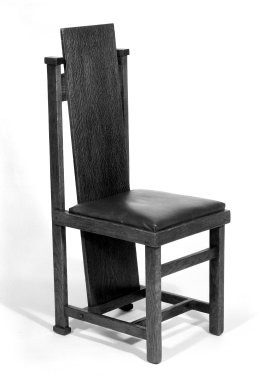
Artist:Frank Lloyd Wright
Medium: Oak, upholstery
Geograhical Locations:
Dates:1904
Dimensions: 40 1/8 x 14 3/4 x 18 1/2in. (101.9 x 37.5 x 47cm) Seat height: 17 in. (43.2 cm)
Collections:
Museum Location: American Art Galleries, 5th Floor, Radical Care
Exhibitions:
Accession Number: 83.157a-b
Image: 83.157a-b_bw.jpg,
Catalogue Description: Oak side chair (a) with reupholstered slip seat (b). Chair: rectilinear, composed entirely of pieces assembled at right angles, with the exception of the back which is a thin plank of oak that runs, at a slight diagonal, from above and between the tops of the single piece stiles, down into the leg stretcher. Slip seat slips from the seat frame. Condition: Fair, due to usage, crispness of all edges and corners is lost.More detailed condition notes: Most noticeable wear as follows (top to bottom): top edge of back, slightly marred to proper left, with small, old chip with slight (ca. ½") loss; to proper right is small area with traces of red paint (ca. 1"); top proper right corner of back with chip resulting in nearly complete loss of corner (damaged area ca. ¾" long); slightly below, at back edge, is small dent with tiny loss. Top, proper right stile block with horizontal loss to outside edge (ca. 5/8"). Vertical splits to top of proper left stile on inside (ca. 1 ¼") and rear 3 ½'. Outside edges of flat back, at juncture with seat, with indentation on both sides where seat fits in. Front corners of seat frame very worn and separating somewhat, with slight losses to all corner edges. Front rail bows slightly causing separation at proper right corner. Scuff marks, bruising, and scratches to front side of flat back at juncture with seat. Inside of seat rails with numerous old repairs. Dried glue and other matter stuck between pieces. Two small blocks that sit on top of left and right rails at back probably replacements. Nails are driven from inside through proper right seat rail. Piece of veneer that originally covered proper left stretcher from back of cross-stretcher to stile, is almost gone. Opposite side retains veneer, but is popping off in middle. Front of proper right leg with three noticeable vertical splits, with small losses, toward inside edge. Glides added to all four feet. Two small parts of top back rail that are exposed to front are noticeably lighter than other surfaces, probably due to cleaning, which had to be done against the grain. Rear cross-stretcher held in not with wood pegs, but with metal bolts. Seat (b) has been re-upholstered with red vinyl. Vinyl is worn and stained and should be replaced with leather. Largest stain is to top center near rear. Gauze-like fabric under seat loose and torn throughout. Rear cross-stretcher held in not with wood pegs, but with metal bolts. Seat (b) has been re-upholstered with red vinyl. Vinyl is worn and stained and should be replaced with leather. Largest stain is to top center near rear. Gauze-like fabric under seat loose and torn throughout.